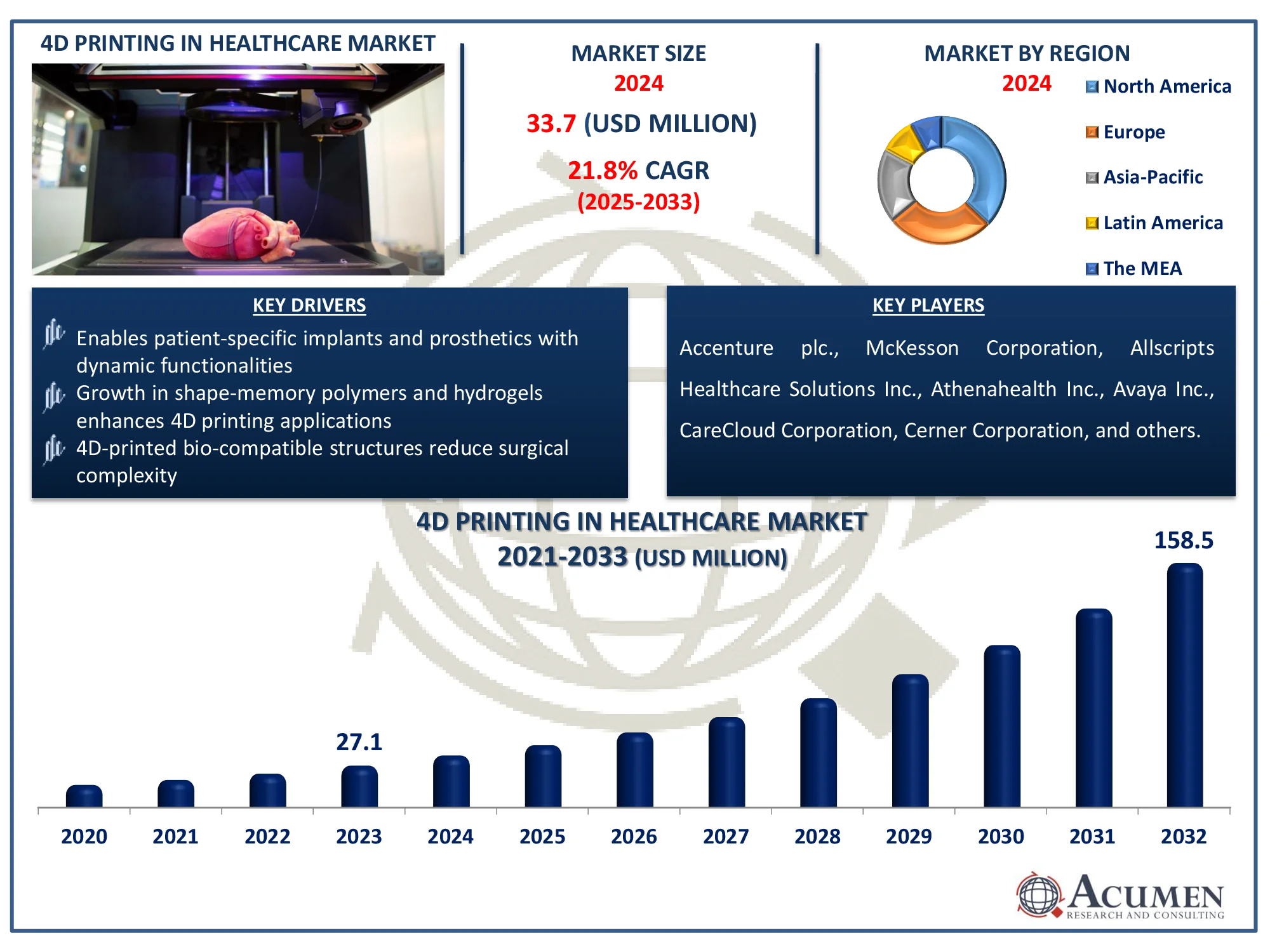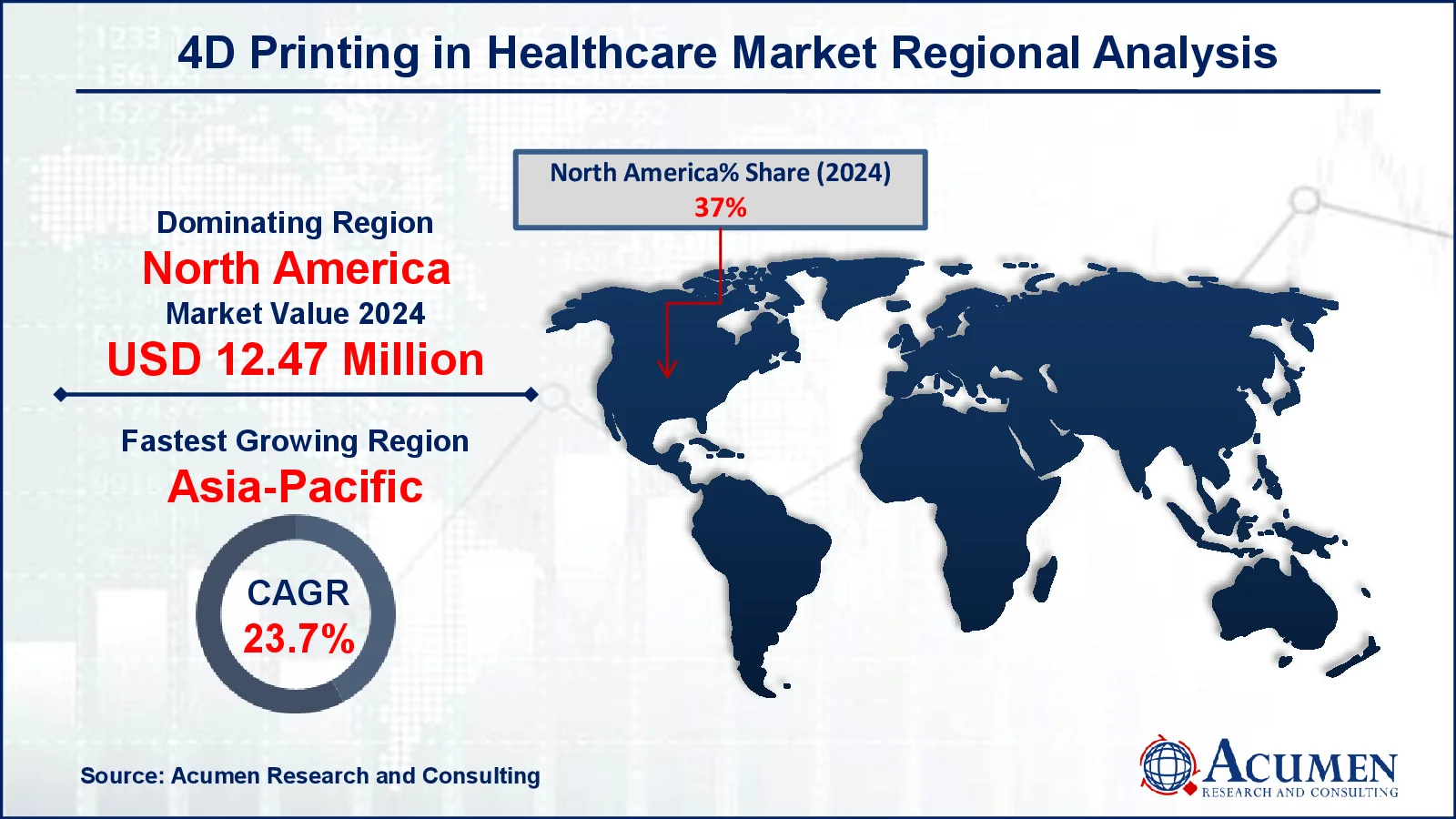4D Printing in Healthcare Market Size - Global Industry, Share, Analysis, Trends and Forecast 2025 - 2033
Published :
Report ID:
Pages :
Format :
4D Printing in Healthcare Market Size - Global Industry, Share, Analysis, Trends and Forecast 2025 - 2033
Report Coverage
- Industry Dynamics
- Market Size and Forecast Data
- Segment Analysis
- Competitive Landscape
- Regional Analysis with a Niche Focus on Country-Level Data
- High Level Analysis - Porter's, PESTEL, Value Chain, etc.
- Company Profiles of Key Players
- Option to Customize the Report As Per Your Specific Need
Request Sample Report
The Global 4D Printing in Healthcare Market Size accounted for USD 33.7 Million in 2024 and is estimated to achieve a market size of USD 195.6 Million by 2033 growing at a CAGR of 21.8% from 2025 to 2033.
4D Printing in Healthcare Market Highlights
- The global 4D printing in healthcare market is projected to reach USD 195.6 Million by 2033, growing at a CAGR of 21.8% from 2025 to 2033
- In 2024, the North America 4D printing in healthcare market was valued at approximately USD 12.47 million
- The Asia-Pacific market is anticipated to expand at a CAGR exceeding 23.7% from 2025 to 2033
- In 2024, the FDM technology sub-segment held a significant share of the market
- Creation of responsive materials that change shape or release medication in response to specific environmental factors, improving treatment efficacy is a popular 4D printing in healthcare market trend that fuels the industry demand

4D printing is an emerging technology that has the potential to alter the artificial organs and prosthetics business. 4D printing, created through cooperation between MIT's Lab and Stratasys, improves standard 3D printing by integrating time as the fourth dimension, allowing printed items to alter shape over time. One significant benefit of this breakthrough is that 3D-printed objects can be updated even after manufacturing, allowing for personalized prosthetics and artificial organs adapted to a patient's physiology. While 4D printing has enormous potential in healthcare, more research is needed to understand its entire spectrum of uses. Researchers have found intriguing applications in chemotherapy, tissue engineering, and self-assembling biomaterials.
Global 4D Printing in Healthcare Market Dynamics
Market Drivers
- Enables patient-specific implants and prosthetics with dynamic functionalities
- Growth in shape-memory polymers and hydrogels enhances 4D printing applications
- 4D-printed bio-compatible structures reduce surgical complexity
Market Restraints
- Expensive smart materials and complex fabrication processes limit adoption
- Struggles in obtaining FDA approvals and ensuring patient safety
- Lack of skilled professionals and research constraints slow market growth
Market Opportunities
- Potential to revolutionize regenerative medicine with self-assembling structures
- Smart materials can enable controlled and responsive drug release mechanisms
- Deployable, self-adapting medical devices for military and disaster scenarios
4D Printing in Healthcare Market Report Coverage
|
Market |
4D Printing in Healthcare Market |
|
4D Printing in Healthcare Market Size 2024 |
USD 33.7 Million |
|
4D Printing in Healthcare Market Forecast 2033 |
USD 195.6 Million |
|
4D Printing in Healthcare Market CAGR During 2025 - 2033 |
21.8% |
|
4D Printing in Healthcare Market Analysis Period |
2021 - 2033 |
|
4D Printing in Healthcare Market Base Year |
2024 |
|
4D Printing in Healthcare Market Forecast Data |
2025 - 2033 |
|
Segments Covered |
By Component, By Technology, By Application, By End-User, and By Geography |
|
Regional Scope |
North America, Europe, Asia Pacific, Latin America, and Middle East & Africa |
|
Key Companies Profiled Aviation |
Accenture plc., McKesson Corporation, Allscripts Healthcare Solutions Inc., Athenahealth Inc., Avaya Inc., CareCloud Corporation, Cerner Corporation, Cognizant Technology Solutions Corporation, eClinicalWorks LLC, GE Healthcare, Genpact Limited, and IBM Corporation. |
|
Report Coverage |
Market Trends, Drivers, Restraints, Competitive Analysis, Player Profiling, Covid-19 Analysis, Regulation Analysis |
4D Printing in Healthcare Market Insights
The wide range of applications, the growing need for organ transplants, and the benefits associated with 4D technology are the primary drivers of the 4D printing market in healthcare. For example, the technology can produce implants as designed that can grow with the patient. Furthermore, it reduces the need for surgical procedures by creating self-deforming components that may treat any defect in the body. 4D printing technology is also valuable in research studies because it allows for product innovation during the design and development stage.
The availability of financing and scientists' increased interest in this new technology are driving an increase in research publications on the subject. For example, in October 2024, the IISc team created nanoengineered hydrogel ink for 4D printing. A team of experts from the Department of Materials Engineering and Bioengineering at the Indian Institute of Science in Bengaluru used this approach to create artificial blood arteries. However, some of the market's limiting issues include expensive development costs, little awareness in low and middle-income nations, and severe regulatory regulations for implantable devices and smart materials used in the product.
Furthermore, in July 2023, researchers at Queen's University Belfast developed tailored 4D-printed "smart" implants for breast cancer care. These versatile implants alter size to fit better within the breast cavity, resulting in a more personalized fit for each individual. This improves the aesthetic and confidence outcomes for persons with or who have had breast cancer. This accomplishment demonstrates the potential of 4D printing in personalized medicine, creating a substantial opportunity for the expansion of the 4D printing in healthcare market.
 4D Printing in Healthcare Market Segmentation
4D Printing in Healthcare Market Segmentation
The worldwide market for 4D printing in healthcare is split based on component, technology, application, end-user, and geography.
4D Printing in Healthcare Market By Component
- Equipment
- Software & Services
- Programmable Materials
According to 4D printing in healthcare industry analysis, in 2024, the software and services segment emerged as the dominant force, owing to the crucial significance of advanced design, simulation, and modeling tools in developing complicated, patient-specific medical solutions. Furthermore, the growing need for customization in prostheses, implants, and drug delivery systems has increased the need for specialist services such as consultation, design optimization, and post-printing changes. The increasing integration of AI and machine learning into 4D printing software has improved predictive modeling and efficiency, making this area critical to the wider use of 4D printing in healthcare.
4D Printing in Healthcare Market By Technology
- PolyJet
- FDM
- Stereolithography
- SLS
According to 4D printing in healthcare industry analysis, FDM technology held the greatest market share in 2024. This can be due to its capacity to construct a mechanically robust model. However, the polyjet segment is expected to grow the fastest throughout the forecast period, as this technology allows for the creation of delicate and complicated structures. It can also create objects with several materials and colors in a single model. Polyjet technology's other significant features, such as little waste and high accuracy, are driving market demand.
4D Printing in Healthcare Market By Application
- Patient Specific Implant
- Medical Research Models
- Surgical Guides
According to 4D printing in healthcare sector analysis, the medical research model sector dominated the market, due to continuous research. These models can be adjusted to match the patient's physiology. Researchers used 4D-printed models to track illness development, test treatment efficacy, and design dynamic, patient-specific anatomical structures for pre-surgical planning. The ability of these models to change shape and function over time has greatly increased biomedical research, resulting in better healthcare outcomes and the expansion of 4D printing applications.
4D Printing in Healthcare End-User
- Hospitals
- Dental Laboratories
- Others
According to 4D printing in healthcare market forecast, hospitals are likely to dominate the industry as important end users due to their increasing adoption of personalized medical solutions such as self-adaptive implants, prosthetics, and drug delivery systems. The use of 4D printing allows hospitals to improve patient care by providing personalized therapies, improving surgical precision, and shortening recuperation times. Furthermore, the capacity to manufacture on-demand, shape-shifting medical equipment within hospital settings reduces dependent on external suppliers, driving efficiency and cost-effectiveness in healthcare services.
4D Printing in Healthcare Market Regional Outlook
North America
- U.S.
- Canada
Europe
- U.K.
- Germany
- France
- Spain
- Rest of Europe
Asia-Pacific
- India
- Japan
- China
- Australia
- South Korea
- Rest of Asia-Pacific
Latin America
- Brazil
- Mexico
- Rest of LATAM
The Middle East & Africa
- South Africa
- GCC Countries
- Rest of the Middle East & Africa (ME&A)
 4D Printing in Healthcare Market Regional Analysis
4D Printing in Healthcare Market Regional Analysis
In terms of regional segments, North America held the largest share of the worldwide healthcare 4D printing market, and it is predicted to increase significantly in the future as a result of ongoing technical advances in the sector. Furthermore, increased demand for organ transplantation and a scarcity of organ donors are expected to drive the regional market throughout the forecast period. For example, OrganDonor.gov reports that 103,223 men, women, and children are on the national transplant waiting list. 17 individuals die every day while waiting for an organ transplant. More than 48,000 transplants were performed in 2024. Other major drivers for the region's dominance include high investment by market players in the production of 4D models, as well as the presence of advanced healthcare infrastructure for the development and implementation of 4D models.
Asia-Pacific is experiencing rapid growth in 4D printing in the healthcare industry. According to data from the National Organ Tissue and Transplant Organization, the number of registered patients on the waiting list for organ transplants climbed from 2,833 in 2021 to 3,275 in 2022. In 2022, the country saw a total of 15,561 organ transplants. The growing number of organ transplants will fuel the expansion of 4D printing in the healthcare market in the forecast year.
4D Printing in Healthcare Market Players
Some of the top 4D printing in healthcare companies offered in our report includes Accenture plc., McKesson Corporation, Allscripts Healthcare Solutions Inc., Athenahealth Inc., Avaya Inc., CareCloud Corporation, Cerner Corporation, Cognizant Technology Solutions Corporation, eClinicalWorks LLC, GE Healthcare, Genpact Limited, and IBM Corporation.
Frequently Asked Questions
What was the market size of the global 4D Printing in Healthcare in 2024?
The market size of 4D printing in healthcare was USD 33.7 Million in 2024.
What is the CAGR of the global 4D Printing in Healthcare market from 2025 to 2033?
The CAGR of 4D printing in healthcare is 21.8% during the analysis period of 2025 to 2033.
Which are the key players in the 4D Printing in Healthcare market?
The key players operating in the global market are including Accenture plc., McKesson Corporation, Allscripts Healthcare Solutions Inc., Athenahealth Inc., Avaya Inc., CareCloud Corporation, Cerner Corporation, Cognizant Technology Solutions Corporation, eClinicalWorks LLC, GE Healthcare, Genpact Limited, and IBM Corporation.
Which region dominated the global 4D Printing in Healthcare market share?
North America held the dominating position in 4D printing in healthcare industry during the analysis period of 2025 to 2033.
Which region registered fastest CAGR from 2025 to 2033?
Asia-Pacific region exhibited fastest growing CAGR for market of 4D printing in healthcare during the analysis period of 2025 to 2033.
What are the current trends and dynamics in the global 4D Printing in Healthcare industry?
The current trends and dynamics in the 4D printing in healthcare industry include enables patient-specific implants and prosthetics with dynamic functionalities, growth in shape-memory polymers and hydrogels enhances 4d printing applications, and 4d-printed bio-compatible structures reduce surgical complexity
Which technology held the maximum share in 2024?
The FDM held the maximum share of the 4D printing in healthcare industry.


